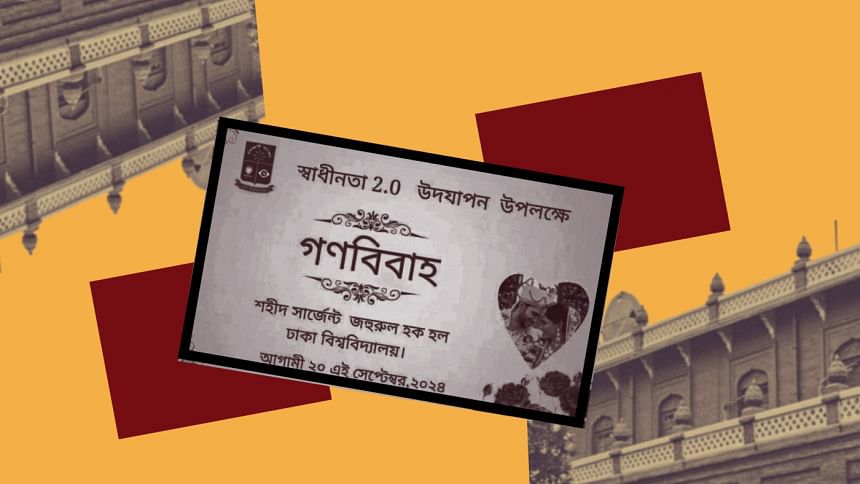Mass wedding in academia: A new kind of ‘taboo-breaking’

I thought it was a joke, one of those social media pranks. But when mainstream media picked it up, the reality struck: students at my university are organising mass wedding ceremonies on September 20. The poster proclaims that the event commemorates Liberation 2.0, hoping that the initiative will break down the "taboos" associated with marriage. The provosts of the concerned residential halls, however, are quick to deny any link between this celebration of collective uprising and the mass marriage initiative. They are unaware of the nuptials taking place under their roofs.
The calculus of knowing and unknowing defines the taboo that is planned to be "broken" through this tying of the knots. The known poster is merely the tip of the iceberg, surrounded by unknown columns. Marriage is not taboo. As we delve into the plethora of comments underlying the news, it becomes evident that those supporting the actualisation of romantic relationships on campus welcome them on religious grounds. We have previously heard of mass weddings without dowries taking place during the annual Ijtema prayers, but the idea of hosting such an event at the apex academic institution of the country is new. I assume someone took the wordplay on BA Shomman (BA Honours) quite literally to pursue "biye with dignity." One hopes that these consensual adults will engage in holy matrimony with the proper presence and consent of their parents and family members. After all, marriage is a social contract. The organisers need to be aware of the possibility that their attempts to break the taboo associated with premarital relationships will codify new norms. An institutionalised mass wedding will replace one form of social regulation with another. It could be symptomatic of the post-ideological world that is unfolding all around us.
There has never been any restriction on students marrying young, except for the convention of forbidding married or pregnant students from living in residential halls. This has been an age-old policy, presumably for the students' safety and to protect their roommates from unnecessary hassles. The hall authority required new students to sign an undertaking, committing them to inform the hall authority of any changes in their marital status and to vacate the hall if they became pregnant. The High Court challenged the issue and overturned the clause, and Dhaka University revoked the decision in 2021. The same happened with Jagannath University in 2023.
The mass wedding has brought to light the issue of housing for married students at public universities. Perhaps the reformed scheme could allow married students to rent a limited number of on-campus flats, given their inability to live in traditional dormitories. This can be especially beneficial for graduate and postgraduate researchers who must continue their education well into their late 20s and early 30s. Indeed, we need to discuss this less-talked-about issue to find a solution.
We are preparing a roadmap to resume regular academic activities. Currently, we are engaged in a series of dialogues aimed at resolving the issues that prevented us from returning to classes after the sudden shutdown that overthrew a government. During one such town hall meeting, a student of mine reminded us of the post-ideological phase that we are experiencing. The traditional narratives of hierarchy and political profiling are no longer applicable. He was implying that teachers often use arrogant rhetoric to intimidate students, trapping them in a cultural appropriation of the "us and them" binary.
Post-ideology challenges traditional social organisation, which upholds belief or faith base as a necessary "civilising" mode for the masses to integrate into society. It challenges people's vertical subordination to the truth of god, king, priests, nation, party, parents, or even department heads. The traditional norm demands a power pivot. What do you do when you don't have a centre to draw your circle of truth? You literally "go through the motions" and create your own norms. The retail version of individualised and personalised opinions replaces wholesale convictions. A similar concept can be utilised to comprehend this mass wedding. Universities cannot segregate education in terms of gender. However, orthodox religious beliefs prohibit a system that could transform a smile or flirtation into something more serious. The mass wedding will institutionalise such unions. Maybe I am overthinking. The whole thing can turn out to be a joke. Alternatively, it could serve as a test for alkaline or acidic elements on campus, with the expectation that the chemical reaction will help us detect pink or blue. The chemical reagents are known; the outcome is unknown.
During the parley, the student raised another important issue. Can we refer to a collective demand as "mob justice" if we are familiar with all the individuals involved in the process? Sure enough, we know the students who asked for disciplinary action against those who supported the previous regime or participated in direct or indirect violence. These familiar faces have presented us with a list of legitimate demands. Are they mobs? Interestingly, mob justice refers to a situation that exerts pressure to yield results in its favour. The focus is on action, not actors. I remember teaching my students Freud's idea of the uncanny, where the unhomely become home; the strange becomes familiar. The post-ideological world, which became popular after the publication of Francis Fukuyama's The End of History and the Last Man (1992), signals the death of all dominant ideological frameworks. The vacuum will cause cultural, social, and political life to become more fragmented, with various groups and individuals pursuing their own interests without a unifying vision.
There is much to learn from this Generation Z as they navigate through these fragments. Some of them are standing on pillars of faith that appear like apparitions. Their arguments are both familiar and unfamiliar. For instance, when you hear the logic of taboo associated with marriage, you may recall the growing trends among independent women who prioritise their career growth over raising a family and fostering an in-law relationship. On the flipside, you can associate the taboo with the idea of a male and a female pursuing an academic goal that traditional religion may not approve of. You decide which pillar to explore.
This is the generation that is upending known ideologies: the utopian socialists who promoted communal living, the liberalist Western concept of free mixing or living together, or the conservative idea of segregating the male from the female altogether. Is it going to be the death of all known ideologies? Will some ideologies become more influential than others? The answer, my friend, is blowing in the wind.
Dr Shamsad Mortuza is professor of English at Dhaka University.
Views expressed in this article are the author's own.
Follow The Daily Star Opinion on Facebook for the latest opinions, commentaries and analyses by experts and professionals. To contribute your article or letter to The Daily Star Opinion, see our guidelines for submission.

 For all latest news, follow The Daily Star's Google News channel.
For all latest news, follow The Daily Star's Google News channel. 










Comments